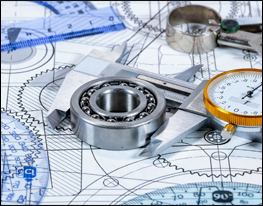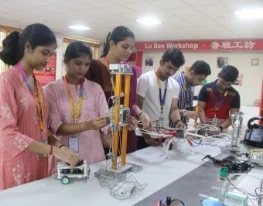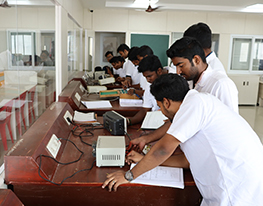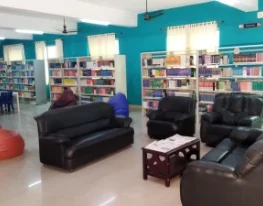About Center for Biomedical Engineering and Research
The Centre– Biomedical Engineering Research (C-BER) is an interdisciplinary hub dedicated to advancing healthcare through engineering innovation. Rooted in scientific excellence and driven by societal needs, the centre bridges the gap between technological breakthroughs and clinical applications, fostering collaboration among researchers, clinicians, technologists, and entrepreneurs.
Vision
To be an internationally acclaimed centre for transforming human health through sustainable biomedical advancements and eco-conscious ethical research. To pioneer groundbreaking solutions and products that revolutionize diagnostics, treatment, and overall wellness by harnessing cutting-edge scientific and technological breakthroughs.
Mission
- Cultivate skills and methodologies that inspire scientific thinking to address global healthcare challenges.
- Develop innovative solutions and products for diagnostics, therapy, preventive care, and wellness to build a healthier society.
- Transform lives through the strategic application of emerging technologies, novel approaches, and sustainable practices.
- Instill human values and ethical principles to meet the evolving needs of the medical sector.
- Strengthen the research ecosystem by providing a dynamic platform for collaboration between industry, academia, and R&D organizations.
Thrust Areas
1. Electrophysiology and Biosignal Research
Focuses on understanding the bioelectrical behavior of the heart, brain, muscles, and nerves for improved diagnosis and treatment.
Key areas:- High-resolution acquisition and analysis of ECG, EEG, EMG, and other biosignals.
- Wearable and implantable electrophysiological monitoring systems.
- Signal processing, machine learning, and modeling for early disease prediction.
- Impact: Enables early intervention, remote health monitoring, and personalized therapy.
2. Medical Image Modelling, Processing, and Analysis
Develops advanced computational tools for enhanced medical image interpretation and patient-specific treatment planning.
Key areas:- 3D anatomical modeling and organ reconstruction from CT, MRI, Ultrasound, and fMRI.
- AI-powered image segmentation, classification, and anomaly detection.
- Simulation and visualization tools for surgical planning and radiology.
- Impact: Supports precision diagnostics and personalized medicine
3. Biomedical Design and Simulation
Designs, prototypes, and validates novel medical devices through engineering principles and simulation technologies.
Key areas:- Ergonomic prosthetics, orthotics, and assistive devices.
- Biomechanics, fluid dynamics, and tissue interaction simulations using Multiphysics software.
- Virtual testing to reduce development time and cost. Impact: Delivers patient-centric, affordable, and reliable healthcare technologies.
4. Diagnostic and Therapeutic Device Development
Translates research into viable healthcare products with a focus on accessibility and compliance.
Key areas:- Non-invasive and minimally invasive diagnostic tools.
- Smart therapeutic systems including targeted drug delivery and biofeedback devices.
- Medical standards compliance and regulatory validation. Impact: Builds cost-effective, indigenous solutions for resource-limited settings.
5. Artificial Intelligence and Data-Driven Healthcare
Leverages AI for faster, more accurate, and predictive healthcare decision-making.
Key areas:- Machine learning and deep learning integration with biomedical signals and images.
- AI-assisted diagnostic support systems.
- Real-time data analytics for remote monitoring and health informatics. Impact: Positions Co-BER at the intersection of engineering, informatics, and clinical excellence.
Collaborative & Translational Ecosystem
Co-BER thrives on partnerships with hospitals, medical colleges, industries, startups, and global research organizations.
Key Initiatives:- Translational research from bench to bedside.
- Intellectual property generation and technology transfer.
- Health-tech startup incubation.
- Advanced training for students and healthcare professionals.
Commitment to Society & Future Healthcare
Co-BER addresses pressing healthcare needs such as chronic diseases, rehabilitation, maternal health, and public health surveillance. By adopting a systems-level, user-centered design approach, the centre develops affordable, accessible, and advanced healthcare technologies aligned with both global and local priorities.

















 Research
Research
